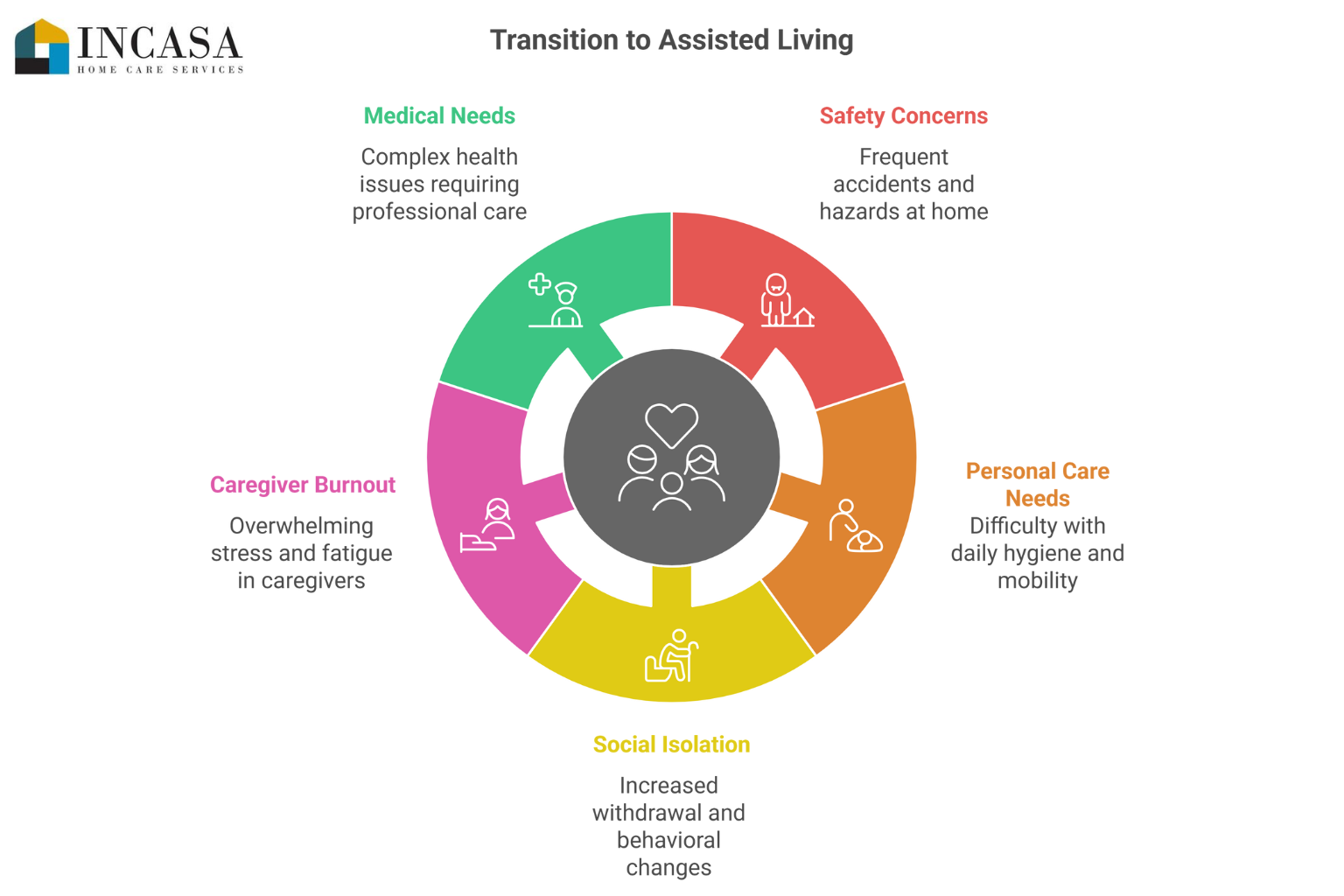Caring for a senior loved one with dementia presents unique challenges that can intensify as the condition progresses. Recognizing when home care may no longer provide adequate support requires careful observation and honest assessment of changing needs. Understanding the key indicators that suggest assisted living might be the next appropriate step can help families make informed decisions about their loved ones’ care.
Safety Concerns Become Frequent or Severe
One of the most significant indicators assisted living may be necessary involves recurring safety issues that cannot be adequately managed at home. Wandering behaviours, which affect up to 60 percent of people with dementia, pose serious risks when supervision gaps occur. Falls become more frequent as mobility and judgment decline, potentially resulting in serious injuries that require medical intervention.
Kitchen safety represents another critical concern. Forgetting to turn off appliances, leaving food to burn, or attempting to cook inappropriate items can create fire hazards. Some individuals may also forget to eat regular meals or take prescribed medications, leading to malnutrition or dangerous drug interactions. When these safety issues occur repeatedly despite preventive measures, professional supervision becomes essential.
Home modifications and safety equipment can address some concerns temporarily, but they cannot replace the constant vigilance required for advanced dementia care. Assisted living facilities provide 24-hour supervision specifically designed to prevent accidents while maintaining residents’ dignity and independence wherever possible.
Sleep disturbances and sundowning behaviours can exhaust family members who must maintain their own work schedules and responsibilities. When primary caregivers become physically or emotionally unable to provide adequate care, the quality of life for both the care recipient and family members is affected significantly.
Professional caregivers in assisted living facilities receive specialized training in dementia care techniques. They understand how to approach resistant behaviours, provide personal care with dignity, and maintain consistent routines that can reduce anxiety and confusion. This expertise becomes invaluable when family members feel overwhelmed by the complexity of care required.
If your senior loved one has been diagnosed with a serious condition and needs help with tasks like meal prep, transportation, bathing, and grooming, reach out to InCasa Home Care Services, a leading provider of senior home care Edmonton, AB, families can trust. We also offer comprehensive care for seniors with dementia, Alzheimer’s, and Parkinson’s.

Personal Care Needs Exceed Family Capacity
The progression of dementia often brings increased resistance to personal care activities such as bathing, grooming, and changing clothes. Family members may find themselves having difficulty with behaviours that professional caregivers are trained to handle. Physical demands of transferring, lifting, and assisting with mobility can become overwhelming for family caregivers who lack proper training or equipment.
Sleep disturbances and sundowning behaviours can exhaust family members who must maintain their own work schedules and responsibilities. When primary caregivers become physically or emotionally unable to provide adequate care, the quality of life for both the care recipient and family members is affected significantly.
Professional caregivers in assisted living facilities receive specialized training in dementia care techniques. They understand how to approach resistant behaviours, provide personal care with dignity, and maintain consistent routines that can reduce anxiety and confusion. This expertise becomes invaluable when family members feel overwhelmed by the complexity of care required.
If your senior loved one has been diagnosed with a serious condition and needs help with tasks like meal prep, transportation, bathing, and grooming, reach out to InCasa Home Care Services, a leading provider of senior home care Edmonton, AB, families can trust. We also offer comprehensive care for seniors with dementia, Alzheimer’s, and Parkinson’s.
Social Isolation and Behavioural Changes Intensify
Dementia often leads to increased social withdrawal and behavioural changes that can be challenging to manage at home. Agitation, aggression, or repetitive behaviours may become more frequent or severe, creating stress for both seniors and their families. Professional environments provide structured activities and social opportunities specifically designed for people with cognitive impairments.
Isolation from peers and limited mental stimulation can accelerate cognitive decline. Assisted living facilities offer specialized programming that includes cognitive exercises, social activities, and therapeutic interventions. These programs help seniors maintain existing abilities while providing appropriate challenges that can slow the progression of symptoms.
The presence of trained staff who understand dementia-related behaviours can provide reassurance and appropriate responses to challenging situations. Rather than becoming frustrated or frightened by behavioural changes, professional caregivers can implement evidence-based strategies to redirect and calm residents effectively.
Family Caregiver Burnout Reaches Critical Levels
Caring for someone with dementia can consume enormous amounts of time and emotional energy, often leading to caregiver burnout. Warning signs include chronic fatigue, increased irritability, health problems, and feeling overwhelmed by daily responsibilities. When family caregivers begin to experience depression, anxiety, or physical health issues related to their caregiving duties, it may be time to consider professional care options.
The interview process for hiring additional home caregivers can be complex and time-consuming. Families must assess potential caregivers’ experience with dementia care, their ability to handle emergency situations, and their compatibility with their loved ones’ personality and needs. Even with hired help, coordinating schedules, managing multiple caregivers, and ensuring consistent care quality requires significant oversight from family members.
Assisted living facilities eliminate many of these coordination challenges by providing comprehensive care teams that work together seamlessly. This allows family members to focus on maintaining meaningful relationships with their loved one rather than managing the logistics of care provision.
Seniors can face a variety of age-related challenges. Though some families choose to take on the caregiving duties, there may come a time when they need a trusted homecare provider. Families sometimes need respite from their duties so they can focus on their other responsibilities, and some seniors need around-the-clock assistance that their families are not able to provide. InCasa Home Care Services is here to help.
Medical Needs Require Professional Supervision
Advanced dementia often brings complex medical needs that require professional monitoring and intervention. Medication organization becomes more challenging as cognitive abilities decline, and the risk of dangerous drug interactions increases. Changes in appetite, weight loss, or difficulty swallowing may require nutritional monitoring and modified diet preparations that exceed typical home capabilities.
Coordination with healthcare providers, physical therapists, and other specialists becomes more frequent and complex. Assisted living facilities typically have established relationships with medical professionals who specialize in geriatric and dementia care. On-site nursing staff can monitor vital signs, track symptoms, and communicate effectively with physicians about changes in condition.
The ability to respond quickly to medical emergencies or changes in health status provides peace of mind for families. Professional staff can recognize subtle changes that might indicate infections, medication side effects, or other health issues that require immediate attention.
Many seniors prefer aging in place over moving to assisted living facilities. If your senior loved one needs assistance to remain safe and comfortable while living at home, reach out to InCasa Home Care Services, a leading Edmonton elderly home care agency. Our dedicated in-home caregivers can assist with meal prep, bathing and grooming, exercise, medication reminders, and many other important tasks. To create a comprehensive in-home care plan for your loved one, give us a call today.



Recent Comments